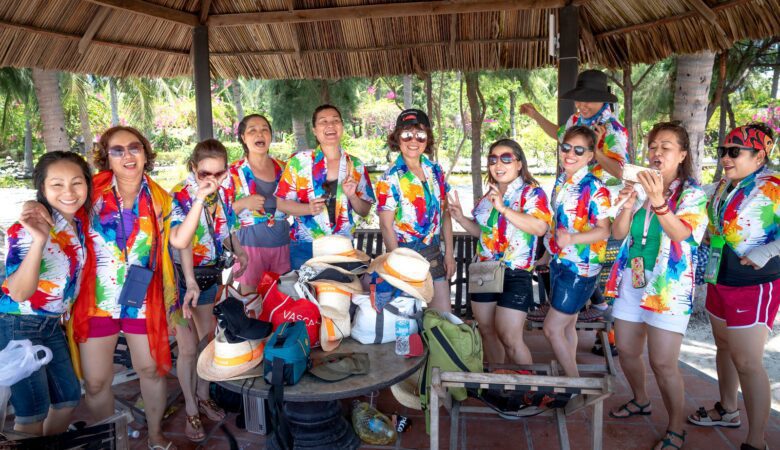Welcome, fellow adventurers! Whether you’re planning a family reunion, a getaway with friends, or embarking on an epic journey with like-minded wanderers, group travel is an experience like no other. It brings people together, creating memories that will last a lifetime. But before you hit the road (or take to the skies), there are some important things to consider and plan for. In this ultimate guide to group travel, we’ll take you through all the tips, tricks, and must-knows that will help ensure your trip is smooth sailing from start to finish. So gather your tribe and get ready for an unforgettable adventure – it’s time to dive into the world of group travel!
Benefits of Group Travel
1. Shared Experiences: One of the greatest joys of group travel is sharing experiences with others. From exploring new destinations to trying local cuisines, every moment becomes more meaningful when you have someone to share it with. Whether it’s laughter-inducing mishaps or breathtaking sights, these shared memories will create a bond that lasts long after the trip.
2. Cost Savings: Traveling in a group often allows for significant cost savings. By splitting expenses like accommodation and transportation among multiple people, you can stretch your budget further and potentially afford upgrades or additional activities that might be out of reach on an individual trip.
3. Safety in Numbers: When traveling in a group, there’s always strength in numbers. Navigating unfamiliar places can feel less daunting when you have fellow travelers by your side. Not only does this provide a sense of security, but it also reduces the chances of getting lost or encountering any unforeseen challenges.
4. Variety and Flexibility: Traveling with a diverse group opens up opportunities for varied interests and preferences when planning activities and excursions. Everyone brings their own unique perspective, allowing for a more well-rounded itinerary that caters to different tastes and desires.
5.
Camaraderie and Support: Group travel fosters camaraderie and support among participants as they navigate new cultures together. From helping each other overcome language barriers to offering emotional support during challenging moments, having travel companions strengthens bonds while simultaneously enhancing the overall experience.
6.
Social Connections: Engaging with locals is an important aspect of immersing oneself in another culture; however, doing so alone may seem intimidating at times.
Group travel provides individuals with added confidence,safety,and encouragement neededto interactwithlocals,resultinginmeaningfulconnectionsand enrichingsocialinteractions
7.
Time for Reflection: While journeying alongside others offers countless benefits,it’s also essentialto carveout personal timeforcarefulthoughtsandreflection.
Grouptravelallowsfortheserenityofindividualreflectionsaswellasthe
Choosing Your Travel Companions
When it comes to group travel, choosing your travel companions is a crucial step in ensuring a smooth and enjoyable trip. After all, you’ll be spending a significant amount of time together, so it’s important to select people who share similar interests and travel preferences.
Consider the size of your group. Are you looking for a small intimate gathering or a larger crowd? Keep in mind that larger groups can sometimes lead to more logistical challenges but can also offer more diverse perspectives and experiences.
Next, think about the dynamics within your potential travel companions. Do they get along well with others? Are they flexible and open-minded when it comes to planning activities and making decisions? It’s essential to choose individuals who are easy-going and adaptable as this will help avoid conflicts during the trip.
Another aspect to consider is shared interests. If you’re an adventure enthusiast, traveling with fellow thrill-seekers will make for an exciting journey filled with adrenaline-pumping activities. On the other hand, if relaxation is your top priority, finding companions who enjoy leisurely strolls on the beach or indulging in spa treatments may be ideal.
Furthermore, communication styles should align among group members. Effective communication ensures everyone is on the same page regarding expectations and plans throughout the trip. Look for individuals who are responsive and proactive in their communication – this will help prevent misunderstandings or last-minute changes.
Don’t forget compatibility in terms of budgeting habits and financial responsibilities. Discuss early on how expenses will be divided so that everyone feels comfortable with their contributions. Traveling with like-minded individuals when it comes to money matters avoids potential conflicts down the line.
By carefully considering these factors when choosing your travel companions, you can set yourself up for an unforgettable journey filled with shared memories and laughter!
Setting a Budget and Planning Expenses
Setting a budget and planning expenses is a crucial aspect of group travel. It helps ensure that everyone is on the same page financially and avoids any unexpected financial burdens along the way.
It’s important to have an open discussion with your travel companions about their individual budgets and expectations. This will help you determine what kind of trip is feasible for everyone involved.
Once you have a general idea of each person’s budget, it’s time to start planning the expenses. Research different destinations and accommodation options that fit within your collective budget. Look for deals or discounts that can help stretch your money further.
Consider creating a shared spreadsheet or using an expense tracking app to keep track of all costs incurred during the trip. This will help distribute expenses evenly among group members and avoid any misunderstandings later on.
Additionally, factor in miscellaneous expenses such as meals, transportation, activities, and souvenirs. Be realistic about these costs and make sure they align with everyone’s financial capabilities.
Remember to leave some room in the budget for unexpected expenses or emergencies that may arise during the trip. It’s always better to be prepared than caught off guard!
By setting a budget and planning expenses carefully, you can ensure a smoother journey for both your wallet and your group dynamics throughout the entire trip!
Selecting a Destination
Choosing the right destination for your group travel adventure is crucial to ensuring everyone has an amazing experience. With so many options out there, it can be overwhelming to narrow down the choices. Here are a few tips to help you make the decision.
Consider the preferences and interests of your group members. Are they nature enthusiasts or city lovers? Do they prefer beach destinations or mountain getaways? By taking into account everyone’s interests, you can find a destination that offers something for everyone.
Next, think about practical considerations such as budget and accessibility. Will everyone be able to afford the trip? Is it easy to reach by air or will there be long drives involved? Keep in mind any specific requirements or limitations of your group members when selecting a destination.
Another important factor is timing. Consider the season and weather conditions at potential destinations during your desired travel dates. You don’t want to end up in a place experiencing heavy rainfall if outdoor activities are on your itinerary.
Do some research on each potential destination’s cultural offerings and attractions. Look for unique experiences that will leave lasting memories for everyone in the group. Whether it’s exploring historical sites, trying local cuisine, or immersing yourselves in vibrant festivals – choose a destination that offers plenty of opportunities for shared adventures.
Remember, selecting the perfect destination requires careful consideration of various factors including individual preferences, practicalities like budget and accessibility as well as timing considerations and cultural attractions available at each location!
Accommodation Options for Groups
When it comes to group travel, finding the right accommodation can make all the difference. Luckily, there are plenty of options available that cater specifically to larger groups. Whether you’re traveling with family, friends, or colleagues, here are some fantastic accommodation choices to consider.
First up is renting a vacation home or villa. This option allows your group to have their own space while still being together under one roof. With multiple bedrooms and common areas, everyone can enjoy some privacy while also enjoying shared spaces for meals and socializing.
If you prefer a more hotel-like experience, booking multiple rooms in a hotel or resort is another great option. Many hotels offer discounted rates for groups and may even provide additional amenities such as meeting rooms or event spaces.
For those on a tighter budget, hostels can be an excellent choice. While dorm-style accommodations might not be ideal for everyone, they offer affordability and the chance to meet fellow travelers from around the world.
Another alternative is booking a block of apartments in serviced apartment complexes. These often come equipped with kitchenettes or full kitchens which can be convenient for preparing meals together as a group.
Lastly but certainly not least, camping or glamping can be an exciting adventure for groups who love the outdoors! Many campgrounds have facilities that accommodate larger groups and provide amenities like communal cooking areas and shared bathrooms.
No matter which accommodation option you choose for your group travel adventure, remember to book well in advance to secure availability and negotiate special rates when possible. Happy travels!
Transportation Options for Groups
When it comes to group travel, transportation can be a major consideration. Fortunately, there are plenty of options available to ensure that your group can get from point A to point B comfortably and efficiently.
One popular option is renting a van or bus. This allows everyone in the group to travel together, making it easier to coordinate schedules and keep everyone on the same page. Plus, with a larger vehicle, you’ll have plenty of space for luggage and any equipment you may need for activities at your destination.
If you’re traveling within a city or urban area, public transportation can be a convenient choice. Many cities have buses or trains that offer discounted fares for groups, making it an affordable way to get around while also experiencing the local culture.
For those who prefer more flexibility and independence, renting individual vehicles might be the way to go. This allows each member of the group to explore at their own pace and visit different attractions based on their interests. Just make sure everyone has access to reliable navigation tools so no one gets lost!
Another option worth considering is hiring a private driver or tour guide. They will take care of all the logistics while providing valuable insights into local history and landmarks along the way.
No matter which transportation option you choose, it’s important to plan ahead and consider factors such as cost, convenience, safety, and environmental impact. By doing so, you can ensure that your group travels smoothly and enjoys every moment of their journey together!
Group Activities and Itinerary Planning
When it comes to group travel, planning activities and creating an itinerary that will satisfy everyone can be a challenge. But fear not! With some careful consideration and creativity, you can ensure that your group has an amazing experience together.
Brainstorm with your travel companions to gather ideas for activities. This could involve anything from sightseeing tours and outdoor adventures to cultural experiences or even just relaxing on the beach. Be open-minded and encourage everyone to contribute their suggestions.
Next, prioritize the activities based on the interests of the group. Remember that compromise may be necessary in order to accommodate different preferences. Consider creating a shared document where each member can rank their top choices, making it easier to find common ground.
Once you have a list of preferred activities, start mapping out your itinerary. Take into account factors such as location proximity, opening hours of attractions, and transportation logistics. It’s important to strike a balance between structured time and free time so that everyone feels included but also has room for personal exploration.
When scheduling the itinerary, keep in mind any dietary restrictions or special needs within the group. Plan meal times accordingly and make sure there are options available for everyone.
Don’t forget about flexibility! While having a detailed plan is great, unexpected opportunities may arise during your trip. Leave some breathing room in your schedule so that you can seize these moments without feeling rushed or overwhelmed.
Communicate regularly with your fellow travelers throughout the planning process. Encourage active participation from all members by sharing updates via email or using collaborative tools like Google Docs or Trello.
Remember – this is YOUR trip together! By involving everyone in activity selection and itinerary planning while maintaining flexibility along the way, you’ll create memories that will last a lifetime.
Communication and Conflict Resolution within the Group
Effective communication is key to a successful group trip. Whether you’re traveling with friends, family, or colleagues, it’s important to establish open lines of communication from the start. This means setting expectations and discussing any potential issues before embarking on your adventure.
One way to ensure smooth communication is by designating a group leader or spokesperson who can act as a central point of contact. This person can disseminate information, coordinate logistics, and address any concerns that may arise during the trip.
In addition to having a designated leader, it’s also crucial for every member of the group to have an opportunity to voice their thoughts and opinions. Encourage open dialogue and active participation so that everyone feels heard and valued.
Of course, conflicts are bound to happen when traveling with a group. It’s natural for different personalities and preferences to clash at times. When conflicts arise, it’s important to approach them with patience and empathy.
Instead of letting tensions escalate, consider addressing conflicts directly but respectfully. Encourage open conversation where each individual has an opportunity to express their feelings without judgment or interruption.
If necessary, find compromises that allow everyone involved in the conflict feel like they’ve been heard while also finding common ground. Remember that flexibility is key – sometimes we need to adjust our own expectations in order for the group dynamics remain harmonious.
Always remember that effective communication involves active listening as much as speaking up. Showing respect towards others’ opinions even if they differ from yours will strengthen relationships within your travel group
Safety Tips for Group Travelers
When embarking on a group travel adventure, safety should always be a top priority. Traveling with a group can bring an extra sense of security, but it’s still important to take precautions and stay vigilant throughout your trip.
First and foremost, make sure everyone in your group has their identification documents readily available. This includes passports, visas, and any other necessary paperwork for the destination you’ll be visiting. It’s also a good idea to have copies of these documents stored electronically or with someone back home.
Another important safety tip is to keep communication lines open within your group. Decide on a designated meeting spot in case anyone gets separated or lost during excursions. It’s also wise to establish regular check-ins so that everyone knows where each other is at all times.
Researching the local customs and laws of your destination is crucial when it comes to staying safe while traveling as a group. Understanding cultural norms can help prevent unintentional disrespect or misunderstandings that could potentially put you in harm’s way.
It’s also essential to remain aware of your surroundings at all times. Pickpocketing and theft can unfortunately happen in crowded tourist areas, so keep an eye on your belongings and avoid displaying valuables openly.
In addition, consider investing in travel insurance for added peace of mind. This can provide coverage for medical emergencies, trip cancellations, or lost luggage – ensuring that unexpected incidents don’t derail your journey.
Trust your instincts when it comes to personal safety. If something feels off or uncomfortable during your travels as a group, don’t hesitate to remove yourself from the situation or seek assistance from authorities if needed.
By following these safety tips while traveling with a group, you can focus more on creating lasting memories together rather than worrying about potential risks along the way!
Cultural Sensitivity and Respect while Traveling with a Group
One of the most important aspects of group travel is cultivating cultural sensitivity and respect. As you explore different destinations and immerse yourself in new cultures, it’s essential to be mindful of local customs, traditions, and beliefs. Here are some tips to ensure that your group travels responsibly:
1. Research the destination: Before embarking on your journey, take the time to educate yourself about the local culture, customs, and etiquette. Understand what may be considered disrespectful or offensive in that particular country or community.
2. Dress appropriately: Be conscious of how locals dress and adhere to their cultural norms. In conservative countries, it’s important to dress modestly when visiting religious sites or public places.
3. Learn basic phrases: Show respect by learning a few key phrases in the local language such as greetings, thank yous, and simple pleasantries. Locals appreciate the effort made by visitors to communicate in their native tongue.
4. Respect personal space: Different cultures have varying concepts of personal space; what may seem comfortable for you could be deemed intrusive elsewhere. Pay attention to cues from locals regarding physical boundaries.
5.
Be mindful of photography: Always ask for permission before taking someone’s photo—respect people’s privacy if they decline or show hesitation.
6.
Support local businesses: Contribute positively to the communities you visit by supporting local businesses instead of large international chains whenever possible.
7.
Be aware of cultural taboos: Every culture has its own set of taboos—subjects or actions that are considered off-limits or disrespectful—for example discussing politics or religion might be sensitive topics depending on where you’re traveling.
8.
Respect sacred sites: When visiting temples, mosques, churches or other religious sites follow any rules regarding attire,manners,and behavior.
Remember these places hold great spiritual significance.
Thus,it is important not to disturb others’ worship practice.
By being respectful and culturally sensitive, you not only enhance your travel experience but also








